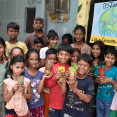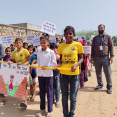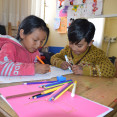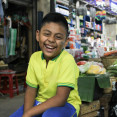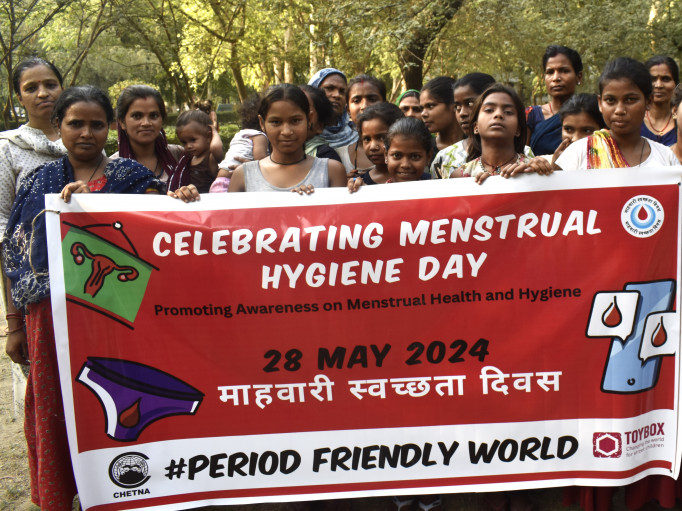
On the 28th May, Toybox's local partner in India, CHETNA, organised an event to mark World Menstrual Hygiene Day. The event aimed to raise awareness about menstrual health and hygiene, breaking taboos, and promoting positive attitudes towards menstruation. The celebration featured a variety of interactive activities designed to engage and educate children and young people.
During the sessions, participants shared their own personal experiences of menstruation, which were later compiled into a collection of stories, which excerpts from are featured below. Pooja Singh, Project Head at CHETNA explains,
"CHETNA has had extensive experience working with street children, particularly girls, and we've encountered numerous heartbreaking stories that shed light on the challenges they face, especially during menstruation. One such poignant account involves girls sharing their struggles with accessing sanitary facilities while living on the streets. Many girls recounted having to use public toilets, where they are charged a fee of 5 rupees each time they need to change their pads, adding a significant financial burden. In communities where public toilets are non-existent, some girls are forced to resort to changing pads in bushes, while others, due to financial constraints, stretch a single pad's usage over two days.We've also heard harrowing tales of girls grappling with pregnancy scares due to irregular menstrual cycles.
Recognising the importance of amplifying these voices and experiences, we realised the value in creating a platform for young girls to share their stories, assumptions, and lived experiences. Thus, our initiative to collect and share these narratives was born, aiming to provide a space where girls can find solace in knowing that they are not alone in their struggles."
Menstrual Hygiene Day 2024 reaches over 500 girls and mothers
Pooja continues,
"We facilitated Menstrual Health and Hygiene sessions with the aim of raising awareness among street girls and mothers living in vulnerable slums about the importance of menstrual health and hygiene practices. Through these sessions, we were able to reach out to over 500 adolescent girls and mothers. Initially, each session commenced with a palpable sense of discomfort and silence, as speaking up meant exposing oneself to potential judgment from others. However, as stories began to unfold, the atmosphere transformed, and the sessions took on a life of their own. Each story shared was a testament to the diverse and often surprising misconceptions surrounding menstruation.
Each of the stories within our collection is crafted from genuine, real-life experiences shared by the girls we work with. We've made a deliberate choice not to assign real names to our characters, ensuring that the trust and confidentiality we've established with our participants is upheld. Our primary intention is to amplify these stories, sharing them with the world so that more young girls who come across them realise that they are not alone in their experiences."

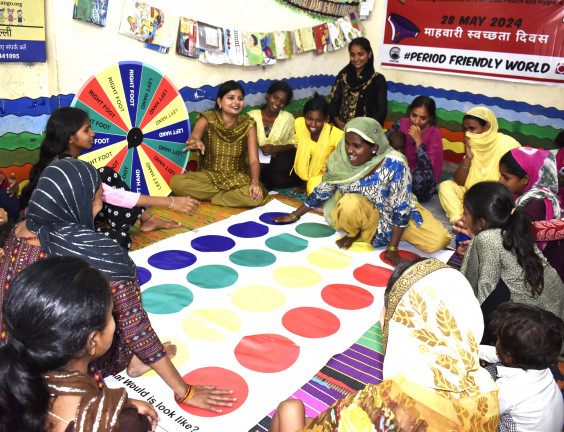
Meet Punni
Fourteen-year-old Punni lives with her family in a community near the railway tracks, where they face significant economic hardships. The family's income is minimal, and her father's informal employment increases the uncertainty about their future. The lack of stable shelter, safe water, and sanitation facilities further exacerbates their living conditions, posing daily challenges for Punni and other children in the area.
Punni shared her experience of getting her first period, describing it as a frightening and confusing time. She was initially unaware of what menstruation was or why it happened, which left her feeling scared and clueless. When it occurred, she didn't know whom to talk to and was too frightened to share her experience with anyone, including her mother, fearing she might be scolded. Punni went to school without telling anyone, where her dress became stained there.
Fortunately, her teacher noticed her distress, provided her with a sanitary pad, and reassured her that getting her period was normal.Later, her mother learned about the incident and advised Punni to be careful and to take care of herself during such times. After attending an educational session on menstruation, Punni's perspective changed significantly. She learned about the biological process behind menstruation and understood its importance. This knowledge made her feel more confident about her periods and taught her the proper use of sanitary pads. Now Punni tries to normalise menstruation by discussing her new-found knowledge with her friends, aiming to break the silence and stigma around periods.


Meet Asmeen, (15)
"It has been two years since I started menstruating, but I still feel uncomfortable recalling my first period. I remember it was a Friday when I first got my period. I was in terrible pain and had no idea what to do. I spoke to my friend Rukhsana, who is much older than me. I felt awful, especially since it was a holy day. With my mother out of town, Rukhsana guided me, teaching me about sanitary pads, and how to use them. Due to my lack of knowledge, I used the same pad for two days. When my mother returned after two days, she also instructed me to change the pads and advised me to avoid spicy and sour foods.
After attending menstrual hygiene awareness sessions twice, I have learned about alternative options to sanitary pads. Recently, I informed one of my friends in the village about the various methods, including the importance of washing hands and the correct placement of sanitary pads. One crucial piece of information I was unaware of was the proper disposal of sanitary pads. Previously, I thought they could be discarded anywhere since they were waste. However, after the sessions, I learned the correct disposal method."
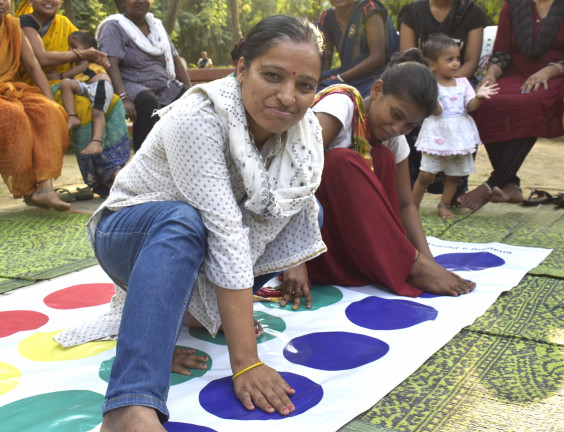

You can help children manage their periods safely and with dignity. Donate a period pack
You can find out more about our work in India here
